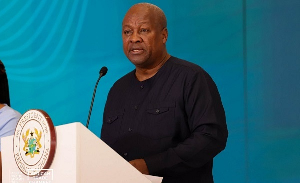The President of Ghana, Nana Akufo-Addo, when having an encounter with the journalists in Ghana recently, indicated that there is an on-going debate within his government to pass a decision on whether or not Ghana should abolish the system of duties paid on imported goods at the ports.
The President added that “there is a strong lobby that is saying that we should go, for instance, the level of Hong Kong, Singapore, Dubai – almost no import duties, everything comes in and it will generate a lot of business.
Since President Akufo-Addo disclosed this idea being discussed, a lot of people have also shared their views, some making reference to the neighbouring country Togo as also operating a duty-free port. Since this it is an on-going debate in the gov’t, I believe the analysis in this article may incomparably help the govt shape the decision for whether or not Ghana should actually adopt the idea of duty-free port.
As good as this idea sounds, the fact is, it can never be an ideal situation for Ghana at its current state. Ghana would need to incredibly comprehend the significance of the reasons behind the policy adopted in each of the countries cited to emulate since each has different deliberate strategic reasons for adopting the policy to achieve some targeted results for the nation.
My little research depicts that, if for any reason, Ghana govt succumbs to the importers lobbyists pressure on the govt to implement the Duty-Free Port idea, it will hurt economy of Ghana enormously for a very long time, considering the production and manufacturing status of Ghana presently, and the trickling down effect on the citizenry shall be far worse than whichever hard time Ghanaians may be experiencing today.
The reason is that, the gov’t of Ghana will have no choice than to increase the VAT or introduce new taxes on all the consumable products imported into the country, simply because what the majority of Ghanaian importers are seeking duty-free on are mostly the consumable items, they're not manufacturing raw materials to produce the items in Ghana.
Ghana must also bear in mind that, most of these consumable items which Ghanaian importers are agitating to have duty-free on are mostly not part of the items enjoying tax-free in some of the countries Ghana has cited to imitate. This is because those countries have developed deliberate policy with reasons to meet their national agenda to increase production of exportable products into other countries to maximise profits.
Some of these countries even frown on giving full duty-free on imported raw materials which are meant purposely to produce consumable items used only in the four corners of the country.
Some of them, to attract 100% duty-free and other benefits, the raw materials imported for production of consumables for local use only must also have the exportable traits as well to maintain international standards. That is some calculated national policies in some of those countries, depending on what each country seeks to achieve.
If I may respectfully ask, what is Ghana's deliberate national policy on this idea to embark on a tax-free port?
From the long analysis below, it will show that, the tax-free port policy in any of the countries cited have never emanated from the agitations of some small group of importers through their lobbyist, a group whose obvious principal interest is how they could make profits on their imported goods into the country and therefore would do anything possible to get them delivered for free. A decision on free-port must be a major conscious attempt to achieve some targeted results which should be considered as a major national policy, well planned with comprehensive compelling reasons to adopt.
Togo's tax-free port as a cited example can never be a good yardstick for Ghana to mimic to follow a good model since all research available indicates that Togo free port has never realised the purpose for which Togo introduced the policy for over 50 years now. Details below will show.
Now, before I delve deeper into this analysis, I would like to pass this remark and pose a question: In the recent years, what is becoming very apparent, and am sure many people might have also observed as well, is that, for the sake of political expediencies and the fear of losing political power, our governments are put under duress to make knee-jerk decisions, to formulate and implement long-term policies to solve some perceived burning issues. But the fact is, such knee-jerk reactions to issues can only be acceptable to use as a short-term corrective instrument to curb a situation in order to effect long-term amendments to an existing policy.
When governments are pressured to take greatly important decisions under coercion to appease the maverick members of their members of the govt or the public, the long-term injurious effect becomes difficult to correct. I feel we need to protect our governments to make laudable decisions not those that seek to serve few self-centred businessmen and women.
The Ghana tax-free port idea, if ever needed, should not be taken lightly. It must be a purposeful major national policy properly decided upon to achieve a particular targeted effect just like Singapore and Hong Kong planned to achieve.
Therefore, the question I would humbly beg to ask is, since when has the debate on or the agitation for “Duty-Free Port” in Ghana developed to the ripened level for the consideration of the govt? Probably, if not due to the recent loud noises spearheaded by some known political/business figures claiming to have been slapped with huge import duties on their imported items.
Should the agitations of these self-centered individuals whose principal interest is to make a massive profit, lead to a tax-free port policy in Ghana? Well, let’s read further.
The Vice President of Ghana, Dr. Mahamudu Bawumia, when speaking recently at the launch of the onboarding programme for National Service Personnel into the National Communications Authority, claimed that an initial assessment of the implementation of the paperless system at the country’s ports has shown a revenue collection improvement of 56 per cent. The Vice President added that the recent 'agitations' against the scheme was meant to derail it due to revenue leakage that was blocked.
This is how he put it: “On September 1, we launched the paperless system, but of course not without attempts to actually derail the process, because it’s hurting a lot of people who were making free money and people who used to take two weeks to clear a container after one day of delay were protesting".
He asked, "Are you protesting the system or something else? The results are amazing. We just looked at data this morning – first week of collections under the paperless system in September this year compared to last year the first week of collections in September 2016, and collections have gone up by 56 per cent; from around GHc130 million to GHc213 million in one week.”
The Vice President concluded that "Govt began the implementation of the paperless clearing system on 1st September 2017, to speed up the process of clearing goods from two weeks to four hours, and ensure order at the port, whilst blocking loopholes.
But the aim to which the system was established experienced some hitches following hundreds of angry Freight Forwarders which thronged the Long room of the Tema Port to protest over the delays in the system at the beginning.”
Shortly later, the Freight forwarders also corroborated positively to the assertion of the Vice President, Dr Bawumia, describing the Paperless Port System as "an ongoing success story that needs to be fully implemented for the benefit of all stakeholders in the maritime industry and the country as a whole".
Now, if what the Vice President said and corroborated by Freight Forwarders is anything to go by, it means there has not been any tariff increase at the Ghana ports, however, the importers are now paying the realistic amount for the goods import into the country. The question is, what is the actual issue? Has anything actually changed at Ghana’s ports apart from the paperless system introduced, and where from the tax-free port idea to happen in the near future?
Simple calculations from data available shows that, Ghana rakes an average revenue of about Ghc12.5 billion per year at the ports.
The question again is, can Ghana afford to cut off this huge money just to allow the importers bring in their goods for free, simply because there are some few known figures agitating for paying the realistic taxes as the loopholes are blocked at the ports? What is the problem?
The curiosity is, if this idea is implemented in Ghana, what method would be used to recoup the Ghc12.5 billion cut off on goods imported and sold in Ghana? The only possible way out is to increase the VAT or introduce new taxes on the consumables on the Ghana market? This would be the only way to recompense for the drastic cut of the GDP at the Ghana free ports.
Well, let’s continue reading further!!
SINGAPORE tax-free port in perspective: Before Ghana seeks to imitate Singapore’s Free Market System, Ghana needs to appreciate the fact that, the port of Singapore is not a mere economic boom with their decision to run tax-free policy, but rather it is an economic necessity for the country simply because Singapore is lacking Land and Natural Resources. Singapore port is strategically positioned between the Indian Ocean and the Pacific Ocean cardinally serving as the main transit point and ideal storage solution for many companies both locally and internationally which the tax-free port policy benefits the country immensely.
We may be interested to know what tangible strategic reasons that would inform Ghana’s decision to go tax-free port at the moment.
On records, Singapore since 2015 has been ranked as the top maritime capital of the world. Checks today reveals that Singapore’s port is currently the world's second-busiest port in terms of total shipping tonnage. The port also trans-ships a fifth of the world's shipping containers, half of the world's annual supply of crude oil, also classed as the world's busiest trans-shipment port. All these come with immense benefits to the country which Ghana would need to compare to imitate Singapore.
With Singapore's incredible planned policy on manufacturing and production, the Singapore Port itself serves as critical for importing natural resources, and then later re-exporting products after they have been refined and shaped in some manner in Singapore, for example, wafer fabrication or oil refining to generate decent revenue, and all these are then Shipped pass between the Indian Ocean and the Pacific Ocean through the Singapore Strait.
Ghana on the other hand, since it lacks multinational factories and production companies with the ability to add value to its natural resources before exporting, would be exporting these natural resources through its supposed tax-free port, then when these raw materials are refined and packaged in countries like Singapore and Hong Kong, would be sent back to Ghana to enjoy Tax-free entry to Ghana market. What would be the benefit for Ghana?
Obviously, the current industrial climate of Ghana is not conducive to engage in duty-free port. Ghana would need to demonstrate that raw-materials imported for production of exportable goods in Ghana surpass its raw-material export before it can significantly benefit from a tax-free port policy.
TOGO Tax-Free Port in perspective: Am sure the readers would like to know how has Togo benefitted from its Tax-Free Port policy?
Lome is the capital city of Togo and hosts the country's major port. Lome port is Togo’s only commercial port. Lome was actually selected as the colonial capital of German Togoland in 1897, the city became important as an administrative, commercial, and transport centre. Although Togo is one of the smallest countries in Africa, however, its location proved to be vital for the economy of several surrounding countries.
Togo is strategically located between Ghana, Burkina Faso and Benin. Lome port serves as the major transit point for international cargo going into these areas. In 1968 the govt of Togo decided to make Lome port a free trade zone, thus opening up transit into the capital cities of Accra, Ghana and Cotonou, Benin, whiles principally serving the landlocked neighbours Niger, Burkina Faso and Mali.
The Togo govt had since had a dream of making Lome port a Tax-Free Zone so as to attract firms and businesses in transforming Lome, the capital city of Togo to become the regional major trading centre. Since then the reports show that Togo’s government has embarked on implementing several reforms and investing in significant infrastructure projects to make Lome a world-class city. The modernization of the Togo port begun in the 1960s, and a deep-water harbour, completed in 1968, initially planned for a 400,000-ton annual traffic, but currently maintains a 3,000,000-ton annual traffic which been the cardinal which has greatly facilitated the exportation of phosphates and other major exports, such as cocoa, coffee, copper, cotton, and palm products from Togo. Again as you can see, these are all raw-materials with no added values just like the state of Ghana today which are just exported from its free port.
Therefore, the question is, for about 50 years since the tax-free port policy was introduced in Togo, what is the state of the capital city, Lome? Has it achieved the main purpose for which the Free Port introduced, despite the govt spends the little revenue accrued to maintain the Togo port? Again, since Togo has already established bilateral trading relationship with the Landlocked countries to use its tax-free port, how is Ghana also going to benefit significantly from the patronage of these countries if Ghana ever introduces a free port policy, bearing in mind that Ivory Coast has its own seaport?
Now On HONG KONG Free Trade Zone: Indeed Hong Kong practices a free port system and the country is flourishing through its free trade. That open policy has made Hong Kong the eighth largest trade area in the world and has made it an international financial and business centre.
What is expressively paramount about Hong Kong's basis for the free trade policy, is the strong and reliable multilateral trading system they created as purposeful national policy. As we know, the World Trade Organization (WTO) was established on January 1, 1995, replacing the General Agreement on Tariffs and Trade (GATT) and strengthening the rules and disciplines of multilateral trade. Hong Kong is known as a founding member of the WTO and has been actively involved in its business. This has been the best proof of Hong Kong’s firm support for an open and free multilateral trading system.
Up until today, Hong Kong has continued to participate in the World Trade Organization as a separate member on behalf of (Hong Kong, China) on 1 July 1997. In addition to the WTO, Hong Kong is also actively involved in other international trade and economic organizations. Hong Kong became a member of the Asia-Pacific Economic Cooperation (APEC) and the Pacific Economic Cooperation (APEC) in 1991.
So from the above background, one can discernibly observe that Hong Kong has strategically established a strong multilateral trading field to benefit from their country.
With this in mind, I would like to ask, for what groundworks has been done by Ghana up till today to embark on a tax-free port policy?
Analysing some known figures leading the agitation of high taxes at Ghana port, and since there has not been any tariff increase at the Ghana port since the assumption of President Akufo-Addo's Presidency, what I may suggest is that, with the loopholes blocked and importers paying the realistic tariffs to reflect the true revenue coming into the govt coffers, there can be a tariff restructuring to scale down the current realistic high tariff, whiles the govt can still be sure that the revenue received is truly the actual amount importers are suppose to pay. Definitely the idea of making Ghana port tax-free is not the answer. The tax-free idea will make Ghana a dumping ground and will kill the vision of industrialisation.
Nevertheless, the govt can continue its business of making everything free free so as to have peace of mind, but the reality is, too much of the freebies has its latent detrimental effect in long term, such kills the entrepreneurial skills and innovative iseas to prosper a nation and makes the citizenry irresponsible to fish for themselves.
Opinions of Sunday, 30 December 2018
Columnist: Peter Antwi Boasiako















